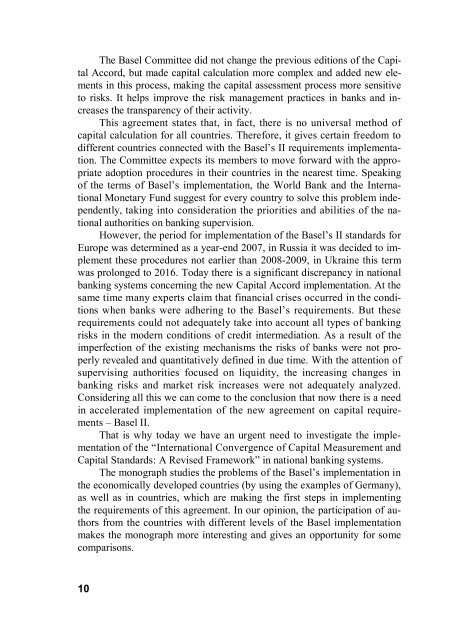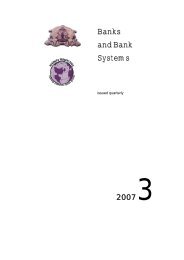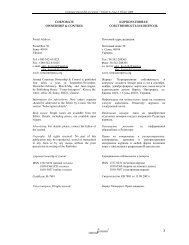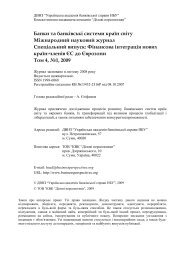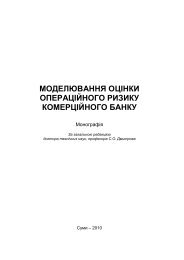BASEL II: PROBLEMS AND USAGE
BASEL II: PROBLEMS AND USAGE
BASEL II: PROBLEMS AND USAGE
You also want an ePaper? Increase the reach of your titles
YUMPU automatically turns print PDFs into web optimized ePapers that Google loves.
The Basel Committee did not change the previous editions of the Capital<br />
Accord, but made capital calculation more complex and added new elements<br />
in this process, making the capital assessment process more sensitive<br />
to risks. It helps improve the risk management practices in banks and increases<br />
the transparency of their activity.<br />
This agreement states that, in fact, there is no universal method of<br />
capital calculation for all countries. Therefore, it gives certain freedom to<br />
different countries connected with the Basel’s <strong>II</strong> requirements implementation.<br />
The Committee expects its members to move forward with the appropriate<br />
adoption procedures in their countries in the nearest time. Speaking<br />
of the terms of Basel’s implementation, the World Bank and the International<br />
Monetary Fund suggest for every country to solve this problem independently,<br />
taking into consideration the priorities and abilities of the national<br />
authorities on banking supervision.<br />
However, the period for implementation of the Basel’s <strong>II</strong> standards for<br />
Europe was determined as a year-end 2007, in Russia it was decided to implement<br />
these procedures not earlier than 2008-2009, in Ukraine this term<br />
was prolonged to 2016. Today there is a significant discrepancy in national<br />
banking systems concerning the new Capital Accord implementation. At the<br />
same time many experts claim that financial crises occurred in the conditions<br />
when banks were adhering to the Basel’s requirements. But these<br />
requirements could not adequately take into account all types of banking<br />
risks in the modern conditions of credit intermediation. As a result of the<br />
imperfection of the existing mechanisms the risks of banks were not properly<br />
revealed and quantitatively defined in due time. With the attention of<br />
supervising authorities focused on liquidity, the increasing changes in<br />
banking risks and market risk increases were not adequately analyzed.<br />
Considering all this we can come to the conclusion that now there is a need<br />
in accelerated implementation of the new agreement on capital requirements<br />
– Basel <strong>II</strong>.<br />
That is why today we have an urgent need to investigate the implementation<br />
of the “International Convergence of Capital Measurement and<br />
Capital Standards: A Revised Framework” in national banking systems.<br />
The monograph studies the problems of the Basel’s implementation in<br />
the economically developed countries (by using the examples of Germany),<br />
as well as in countries, which are making the first steps in implementing<br />
the requirements of this agreement. In our opinion, the participation of authors<br />
from the countries with different levels of the Basel implementation<br />
makes the monograph more interesting and gives an opportunity for some<br />
comparisons.<br />
10


